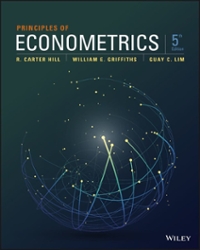Consider the regression model (y_{i}=beta_{1}+beta_{2} x_{i}+e_{i}) where the pairs (left(y_{i}, x_{i} ight), i=1,2, ldots, N), are random
Question:
Consider the regression model \(y_{i}=\beta_{1}+\beta_{2} x_{i}+e_{i}\) where the pairs \(\left(y_{i}, x_{i}\right), i=1,2, \ldots, N\), are random independent draws from a population, \(x_{i} \sim N(0,1)\), and \(E\left(e_{i} \mid x_{i}\right)=c\left(x_{i}^{2}-1\right)\) where \(c\) is a constant.
a. Show that \(E\left(e_{i}\right)=0\).
b. Using the result \(\operatorname{cov}\left(e_{i}, x_{i}\right)=E_{x}\left[\left(x_{i}-\mu_{x}\right) E\left(e_{i} \mid x_{i}\right)\right]\), show that \(\operatorname{cov}\left(e_{i}, x_{i}\right)=0\).
c. Will the least squares estimator for \(\beta_{2}\) be (i) unbiased? (ii) consistent?
Fantastic news! We've Found the answer you've been seeking!
Step by Step Answer:
Related Book For 

Principles Of Econometrics
ISBN: 9781118452271
5th Edition
Authors: R Carter Hill, William E Griffiths, Guay C Lim
Question Posted:





